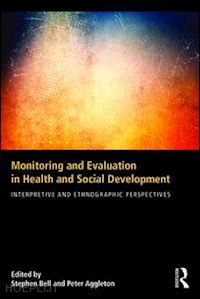1. Interpretive and Ethnographic Perspectives – Alternative Approaches to Monitoring and Evaluation Practice Stephen A. Bell and Peter Aggleton Part 1: The Present Challenge 2.The Political Economy of Evidence: Personal Reflections on the Value of the Interpretive Tradition and its Methods Angela Kelly-Hanku 3. Measurement, Modification and Transferability: Evidential Challenges in the Evaluation of Complex Interventions Helen Lambert 4. What Really Works? Understanding the Role of ‘Local Knowledges’ in the Monitoring and Evaluation of a Maternal, Newborn and Child Health Project in Kenya Elsabédu Plessis and Robert Lorway PART 2: Programme Design 5. Permissions, Vacations and Periods of Self-regulation: Using Consumer Insight to Improve HIV Treatment Adherence in Four Central American Countries Kim Longfield, Isolda Fortin, Jennifer Wheeler and Dana Sievers 6. Generating Local Knowledge:A Role for Ethnography in Evidence-based Programme Design for Social Development Ruth Edmonds7. Interpretation, Context and Time: An Ethnographically Inspired Approach to Strategy Development for Tuberculosis Control in Odisha, India Jens Seeberg and Tushar K. Ray 8.Designing Health and Leadership Programmes for Young Vulnerable Women Using Participatory Ethnographic Research in Freetown, Sierra Leone Naana Otoo-Oyortey, Elizabeth King and Kate Norman Part 3: Monitoring Processes9. Using Social Mapping Techniques to Guide Programme Redesign in the Tingim Laip HIV Prevention and Care Project in Papua New Guinea Lou McCallum, Jennifer Miller, Scott Berry and Christopher Hersey 10. Pathways to Impact: New Approaches to Monitoring and Improving Volunteering for Sustainable Environmental Management Jody Aked 11.Ethnographic Process Evaluation:A Case Study of an HIV Prevention Programme with Injecting Drug Users in the USA Yan Alicia Hong, Shannon G. Mitchell, James Peterson, Carl Latkin and Karin Tobin 12. Using the Reality Check Approach to Shape Quantitative Findings: Experience from Mixed Method Evaluations in Ghana and Nepal Dee JuppPart 4: Understanding Impact and Change 13. Innovation in Evaluation: Using SenseMaker to Assess the Inclusion of Smallholder Farmers in Modern Markets Irene Guijt 14. The Use of the Rapid PEER Approach for the Evaluation of Sexual and Reproductive Health Programmes Eleanor Brown, Rachel Grellier and Kirstan Hawkins 15. Using Interpretive Research to Make Quantitative Evaluation More Effective: Oxfam's Experience in Pakistan and Zimbabwe Martin Walsh 16. Can Qualitative Research Rigorously Evaluate Programme Impact? Evidence from a Randomised Controlled Trial of an Adolescent Sexual Health Programme in Tanzania Mary Louisa Plummer











